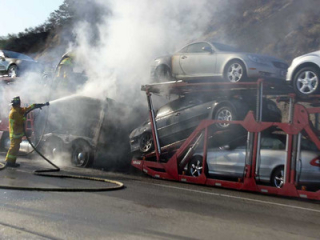Tractor Trailer Brakes On Fire!
-
Blogs By Author
-
Blogs By Tag
I arrive at work around 5 am to get the truck and trailer all ready to go by 5:30 for Seneca, MO, to the Smucker's plant. Extra loads are needed due to the holiday season. I pulled out of the drive at 5:30. At the Pleasant Grove exit there are some construction workers doing their thing. As I pass by, the smell of something burning fills the cab. Instantly I am alert and looking at all of my gauges to see if there is something wrong. I look for smoke from the motor and I check all of my mirrors to see if I can see anything back there in the dark that may be wrong. Nothing I found told me there was any trouble.

Soon after, as I was passing another semi, the burning smell returned. Again I check out all of the possibilities, but find nothing, and and the smell goes away. The semi I had just passed decided to speed up and pass me. As he did, the smell returned once again! Again I check everything. When the truck gets back into my lane, I notice that the right side mudflap has more reflective markings than the left side. This is nothing unusual because the reflective markings get dirty and torn off from time to time. But soon I notice that there is something wrong. As the truck pulls further ahead I can no longer see my headlights on the back of his trailer, but there is some sort of light coming out from underneath it.
I can only go 65 mph because that is what our fleet is set at, and this truck is getting away from me. It's getting difficult to see what's happening. About this time, another truck passes me. When he gets up to the truck that I'm watching, he applies his brakes and stays just behind him. Then, he speeds up, gets around the truck I'm watching, and applies his brakes to slow the other truck down. Now I can catch up to both of them!
At this point the light is much brighter and I can see that his brakes are on fire!!! I move to the left lane to try to get side by side with this truck so I can get up to the driver and get his attention. His CB must not be on. We are now approaching the Missouri line. The lead truck gets through the next stop light and pulls off onto the shoulder so he can flag down the burning truck. I am still in the left lane and we get the red light. I turn on my interior lights and lower the passenger window (electric windows are great in a semi) to get the driver's attention. He lowers his window and I tell him, "YOUR BRAKES ARE ON FIRE! PULL THROUGH THE LIGHT AND I WILL STOP WITH YOU!!" He is quite surprised at this news and checks his mirrors.

The light turns green and I go first. I pull over onto the shoulder with my flashers going and he stops a few feet behind me. The lead truck sees that everything is under control, so he leaves. I get out of the truck and grab the fire extinguisher and the driver of the burning truck does the same. We run to the back of the trailer, he goes underneath, and uses both of our extinguishers on the flames. A cop is there almost immediately and I assume that the truck that left must have called him. A fire truck is also called as we were not able to get the fire completely out.
I finally left the scene at about 6:15 and I was only a mile away from the plant I was going to for my 7 am appointment! The day was saved, and I still made my appointment time!
A Note From Brett Aquila
In case you're wondering why the fire wasn't put out with two fire extinguishers, it's because brake fires are incredibly difficult to put out. The brake shoes and drums can reach very high temperatures and take a long time to cool off! Once they've reached high enough temperatures to ignite the shoes themselves and any grease that may be in the area, the fire continues to re-ignite even after you've tried putting it out several times. The fire won't stay out until the brakes can be cooled down. So it isn't uncommon to hear about brake fires that end up burning the trailer to the ground because there wasn't enough water or fire extinguishers around to put the fire completely out. If you ever happen to see a tractor trailer with a brake fire, make sure the fire department is called. A fire extinguisher will not often be able to put it out.
Related Articles:







 TT On Facebook
TT On Facebook